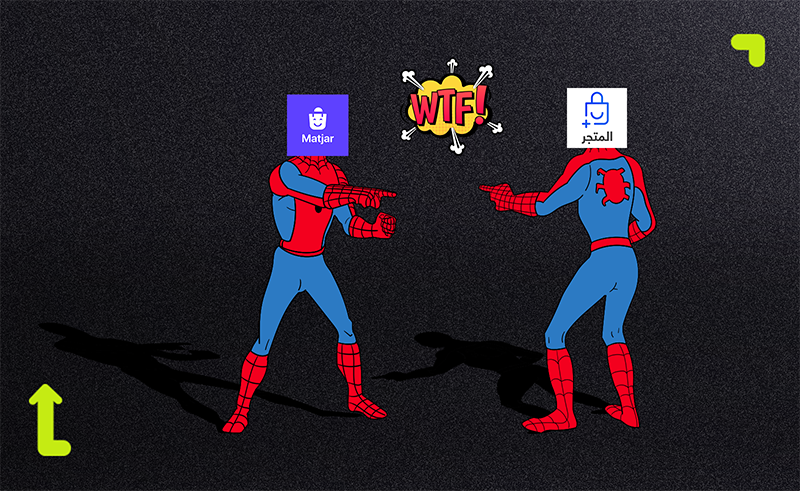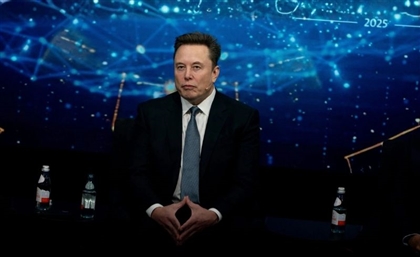What Would You Do If You Found Your Startup’s Doppelgänger?
While he surfed the world wide web for new startups, Startup Scene's Ahmed Budalama found two e-commerce platforms whose resemblance was uncanny.

In today’s traditional investing philosophy, the most innovative firms that potentially make the most amount of money are those who reign successfully. So, from business books to business schools and corporate boards, everyone is talking about innovation. But, sometimes, copying others is a reality of doing business. In street open markets, fruit vendors will switch from selling bananas to selling yams once they notice that their peers are making more profits from yams.
As a writer and content creator here at Startup Scene, I am constantly exposed to a tremendous number of startups. Learning about a new one each day, I began to realise the common similarities exclusive to the Egyptian business landscape. During my research on what’s new and what’s hot in the entrepreneurial scene, I stumbled upon two uncomfortably similar startups. Confusingly, I reached out on social media to ask some questions. I got in touch with esteemed representatives from two Egyptian e-commerce and software newcomer startups, GetMajar, and AlMatjar, who both worked on their startups in 2019, and officially launched their product just a couple of months ago.
Meet the Doppelgängers
AlMatjar is an e-commerce startup by Ahmed Fawzy, the founder and CEO who came up with a localised, Arabic-language approach that makes clients consider a more familiar approach than global competitors with software that’s built for different geographical landscapes, such as Shopify’s difficulty to penetrate an unfamiliar market. The startup’s corporate strategy includes providing an all-rounded digitisation of online stores, where merchants can create fully customisable Souq-like online marketplaces with prices ranging from $3 (EGP 430) to $122 (EGP 1,970) per month. The startup’s efforts to introduce a disruptive model works well with the targeted Egyptian market’s needs – the startup works hand-in-hand for a personal experience, as they strive to solve real problems faced by customers and provide loyalty as a proof of their work’s favourable quality.
On the other hand, GetMatjar is a startup by Wissam Saleh, who leads a technology software firm that emerged with an idea to make things even simpler, and adding an extra layer of being exclusively a mobile-based platform. With knowledge in the e-commerce landscape, the firm wanted to eliminate the very-specific way Egyptian shoppers utilise Instagram and Facebook’s purchasing features, and allow brands and merchants to set up a mobile-based platform that includes some social features such as chat support, order placement, automated messaging, etc. With a subscription of $15 per month or $150 per year, the startup managed to garner 200 monthly subscriptions within two months of operations.
The line started to blur, once I began to unveil what both startups had to offer, analyse their answers as well as their product. But the various questions that fogged my mind remained. Copying is a primal human skill that we need for survival, at least that’s what American psychologist, Albert Bandura, thought when he coined the ‘social learning theory’, which proposes that new behaviors can be acquired by observing and imitating others. He also claims that people can learn to partake in behaviors that incur a reward and avoid behaviors that incur a punishment just from observing other people receive rewards and punishments for their own behavior.
I asked the founders how they deal with this phenomenon, and if they were aware about each other’s existence, and if they are willing to rebrand or even consider working together:
“For us, it’s not all about branding, it’s about understanding how competitive the market is. It’s about competition intelligence, keeping an eye on competition whilst proving that we can provide value in our service that is uniquely ours," says Ahmed Fawzy CEO and founder of AlMatjar. "Competitor Intelligence is such an important factor that many startups ignore but this should not be the case in today’s competitive market conditions. That’s how brands stay in the market, by providing real value through usability, loyalty and trust with their customers, which makes or breaks a product as unique,” he adds.
Stated in a report by the Harvard Business Review, even developed European and American companies where some can face legal trouble due to copyright infringement, copy — though with enough sophistication to avoid legal problems. Despite all the branding differences, Apple iCloud, Microsoft SkyDrive, Google Cloud Storage, and Dropbox are imitating one another. And who can argue that smartphone manufacturers aren’t copying each other either?
The Aftermath of a Brand Identity Crisis
“Sure, rebranding is an option that is in the plans for us soon – to make our business stand out in the face of competition – but it’s not a priority,"says Wissam Saleh, CEO and founder of GetMatjar; adding that their priority is providing excellent service through their product, which aligns with their mission as a startup.
"We’re not just going to fight over a name and force ourselves to pick something or the other," he elaborates. "We’re in our very-own journey, and we’re learning as we go. The way we do it is just to listen to the user, we actually hold focus groups and have potential consumers use our platform so we can build a better experience.”
However, sometimes success comes in employing a new business model to disrupt an industry, and is often done with the use of advanced technology. For example, Uber’s business model disrupted the taxi industry because they introduced a model where they pair up the drivers and passengers in real-time via an app. Because it proved to be successful in disrupting the taxi industry, this model of providing on-demand service cheaply by cutting out the middleman has been replicated in other industries.
“I truly believe that the brand lies in the mind of the consumer, so find your customer’s real needs and keep your eyes on the competition,” says Fawzy.
Entrepreneurs still need to think about whether they need to innovate when there are business models and brands that can be copied lawfully, and whether they should consider more innovative branding options. “No good can come out of going and copying the competitors, the more you observe, the more you become like them. So, there is no point because originality comes from within,” says Saleh.
For an expert, impartial voice, we turned to Egyptian brand strategist and founder of Pew Design Bureaux, AlHassan Elwan for consultation on the matter. "I’ll start off by saying neither of them has any problem. Or at least without understanding their strategy or intent, it’s not possible to know. From the naming, it’s safe to infer that they’re both going for an in-your-face direct/explanatory approach with the naming. They’re basically saying hey we’re an e-store," says Elwan.
The award-winning creative was able to provide a third perspective on the subject, as he claims to have witnessed many similar cases, in fact, too many for him to recall any familiar example. "To survive, they’ll have to build their brand to show difference," he says. "They'll need to find ways to make their audience remember them for something different and not just the name or what they do."
When it comes to rebranding as an alternative solution to this issue, the option lies in what each entity seeks to serve with its product in terms of efficiency as well as the originality of the product. Elwan's advice is in support of rebranding, as it would make each startup stand out as more unique with a memorable identity.
"No, they don’t have to compromise, rather add more to themselves and make sure what they’re adding contributes to giving them difference and uniqueness," says Elwan. "I also would advise to never think about branding as just a mere look or logo, and understand that it’s always about communicating with your consumer while establishing authenticity and building brand belief. You can have the most unoriginal logo or the most visually forgettable logo but maintain a successful brand."
Reaching a consensus on the matter, the brand strategist urges that startups facing this kind of struggle can thrive if they align their strategy correctly along with their objectives.




















